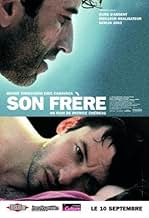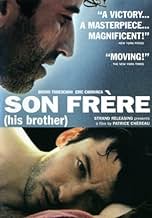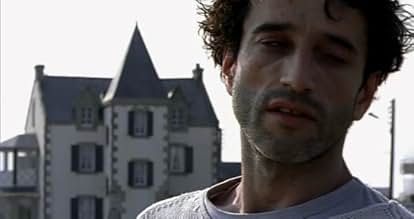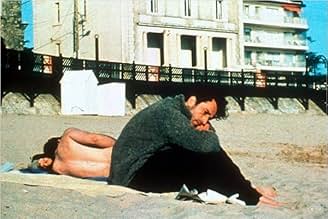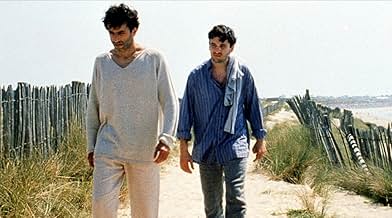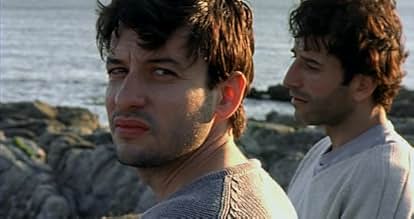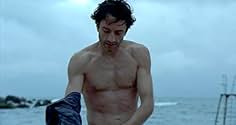IMDb-BEWERTUNG
6,9/10
2027
IHRE BEWERTUNG
Füge eine Handlung in deiner Sprache hinzuTwo brothers with a problematic relationship in the past, find together again when the elder one gets a dangerous disease and asks his brother to accompany him to several doctors.Two brothers with a problematic relationship in the past, find together again when the elder one gets a dangerous disease and asks his brother to accompany him to several doctors.Two brothers with a problematic relationship in the past, find together again when the elder one gets a dangerous disease and asks his brother to accompany him to several doctors.
- Regie
- Drehbuch
- Hauptbesetzung
- Auszeichnungen
- 2 Gewinne & 4 Nominierungen insgesamt
Empfohlene Bewertungen
10EdgarST
This was Chéreau's best since "L'homme blessé", an excellent little film about affection, compassion, brotherly love, death, courage. The proposed situation (an older brother dying from a blood disease seeks the support of his younger brother, somehow evoking the most critical days of the spread of AIDS) is handled with a calm tone, in a rather "Cartesian approach", not lacking bursts of emotion, but avoiding facile sentimentality. Fine script by Chéreau and Anne-Louise Trividic, from a novel by Philippe Besson, with a clever structure intersecting different planes of time, plus good performances all over, especially by Bruno Todeschini and Éric Caravaca, and firm direction by Patrice Chéreau.
The other like part of yourself. Shadows of past and a fragile present. Fear, emotions and long expectation. And the pain like moral mirror.
A meditation-film. Beach, sea and a hospital. Blood-sick and an ambiguous form of love. Questions, illusions, slices of hate and way of survive. A strange passing and subtle exploration of relation between brothers.
Depressing images and circles of freedom. Nooks of gestures and aspects of reality like symbols of fiction. Compasion like only instrument to define the rules of strange and cold universes. And colors of sentiments essence.
The end of film marks the last words of a subtle poem. The shadow of ataraxia after a long trip, taste of peace after a terrible fight, touch of new images and possibilities after a powerful interior tempest.
A meditation-film. Beach, sea and a hospital. Blood-sick and an ambiguous form of love. Questions, illusions, slices of hate and way of survive. A strange passing and subtle exploration of relation between brothers.
Depressing images and circles of freedom. Nooks of gestures and aspects of reality like symbols of fiction. Compasion like only instrument to define the rules of strange and cold universes. And colors of sentiments essence.
The end of film marks the last words of a subtle poem. The shadow of ataraxia after a long trip, taste of peace after a terrible fight, touch of new images and possibilities after a powerful interior tempest.
I saw Son Frere recently in Montreal in the original French (no subtitles). It certainly was a "brooding" dark film that really concentrated on closeups and detail in the European tradition. For me, the changes in time and settings did not take away from the relationship theme of the two brothers and their gradual reconciliation. I thought the detailed hospital scenes were a bit long but very realistic, though sombre. Ironically, I did not find the film depressing as it gave hope that something good comes in times of crisis. I will remember the film more for the two main actors, who I think were very well cast in these roles. It was more like watching a play or "the real thing" with long moments of silence or little spoken to reflect. Not a film that may have "mass appeal" but worthwhile seeing and memorable.
8B24
When I saw this film recently on the Sundance Channel, I had no advance knowledge of it. That is how I prefer to watch any film, but publicity -- being what it is -- usually stands in the way of any such cleanly objective approach.
In this case, the story is told in segments that play around with chronological time yet achieve an overall effect of linearity. Central to the film are scenes in the hospital that capture as no other film I have seen the stark and compressed place where life and death coexist. Normally that suggests soap opera bathos, as in such TV dramas as ER or General Hospital. But here is only an overwhelming display of truly remarkable clinical minutiae, against which an inner drama between the characters is allowed to play out either in silence or in visual takes showing the characters reacting to an unfolding revelation of who they really are and how they relate to each other. The director achieves his goal through understatement, with few exceptions. Quintessentially French.
Even the love scenes, such as they are, have a clinical feel to them. If I have one negative comment, it is that the film lacks any contrasting relief from its lugubrious tone, no touch of irony or brief bit of self-effacement. Small wonder some viewers may find it flat or uninspiring.
Yet the tacit theme of finding new ways of looking at oneself through suffering and change stands out. The two brothers are seen to rekindle a relationship that had been lost or misplaced, even as death approaches inexorably. I would not mind sitting through it again to examine more closely some of its subtleties hiding behind the sledgehammer reality of hospital life.
In this case, the story is told in segments that play around with chronological time yet achieve an overall effect of linearity. Central to the film are scenes in the hospital that capture as no other film I have seen the stark and compressed place where life and death coexist. Normally that suggests soap opera bathos, as in such TV dramas as ER or General Hospital. But here is only an overwhelming display of truly remarkable clinical minutiae, against which an inner drama between the characters is allowed to play out either in silence or in visual takes showing the characters reacting to an unfolding revelation of who they really are and how they relate to each other. The director achieves his goal through understatement, with few exceptions. Quintessentially French.
Even the love scenes, such as they are, have a clinical feel to them. If I have one negative comment, it is that the film lacks any contrasting relief from its lugubrious tone, no touch of irony or brief bit of self-effacement. Small wonder some viewers may find it flat or uninspiring.
Yet the tacit theme of finding new ways of looking at oneself through suffering and change stands out. The two brothers are seen to rekindle a relationship that had been lost or misplaced, even as death approaches inexorably. I would not mind sitting through it again to examine more closely some of its subtleties hiding behind the sledgehammer reality of hospital life.
If you know Chéreau mainly by his version of Alexander Dumas' novel La Reine Margot or maybe even more famous adaptation of Hanif Kureishi's Intimacy, get ready for something very different. His brother is not history based, there are no mass scenes or attractive dissolute individuals, there are no explicate sex scenes, only delicate human story of illness demystification, complicated family relationships and about love in general. You need patience, compassion and strong stomach for this film. About two thirds of the audience left the cinema before the end. I did not even think about it. I loved it. It was unforgettable. Thomas and Luc are brothers who had lost their closeness long time ago and do not keep in touch until the older one gets strange sickness. Thomas' blood cannot coagulate, doctors are not capable to help, his girlfriend leaves him, his parents argue at his bedside and the only one who stays besides him is his younger brother. Entirely confused and unprepared, in the beginning Luc resists the need to stay with his brother. In a sad hospital surrounding he meets every day a cold doctor, dense nurses and quiet, resigned patients. With no disgust, Chéreau shows plenty of ugly scars, wrinkled skin, hairs, bruises, shiners and burdensome long lasting medical procedures that are not pleasant for sure, but do prepare for death. The sequence where Luc meets nineteen-year old Manuel is astonishing. Gay-oriented man notices Manuel's big eyes and gorgeous lips, still present traces of unusual beauty. During the spontaneous chat with this cut-like-a-piece-of-meet boy full of wounds and scars Luc feels more empathy and warmth than he feels for his own brother. An affecting scene when Manuel's and Luc's hands touch will later repeat with Thomas, when closeness they used to have in their childhood is re-established between two brothers. Retrospectively mixed events unavoidably lead to the fact they are left all alone, with no partners and parents, aware of inescapable death. The act of dying will not be shown so there will be no real cathartic discharge. The right song used at the right place provokes so appalling shudders that every future listening to the same song will surely bring them back. The bitter voice of Marianne Faithful in "Sleep" from her album "A secret life", the song so beautiful and so sad conjures the climax up. This is where the soundtrack starts and ends. Ashes to ashes, dust to dust, as the song says.
Wusstest du schon
- SoundtracksSleep
Performed by Marianne Faithfull
Written by Marianne Faithfull, Frank McGuinness (as Frank McGuiness), Angelo Badalamenti
© ANLON MUSIC Co. (P) 1995 ISLAND RECORDS INC.
Avec l'aimable autorisation de Universal Music Projets Spéciaux
Top-Auswahl
Melde dich zum Bewerten an und greife auf die Watchlist für personalisierte Empfehlungen zu.
- How long is His Brother?Powered by Alexa
Details
Box Office
- Bruttoertrag in den USA und Kanada
- 22.834 $
- Eröffnungswochenende in den USA und in Kanada
- 6.802 $
- 4. Apr. 2004
- Weltweiter Bruttoertrag
- 131.195 $
- Laufzeit
- 1 Std. 32 Min.(92 min)
- Farbe
- Sound-Mix
- Seitenverhältnis
- 1.85 : 1
Zu dieser Seite beitragen
Bearbeitung vorschlagen oder fehlenden Inhalt hinzufügen

